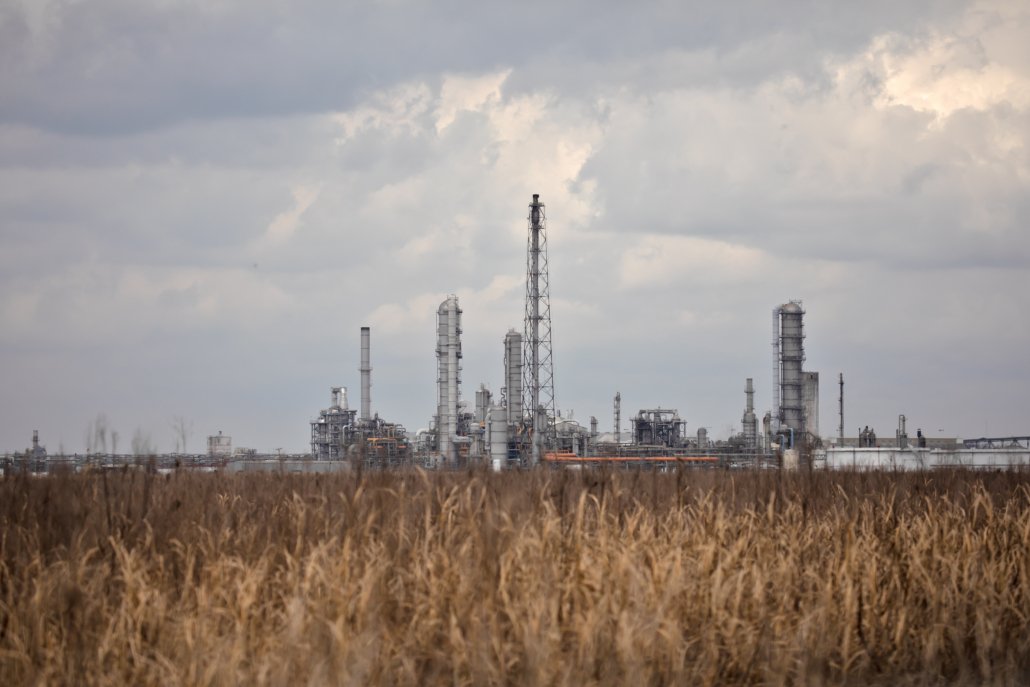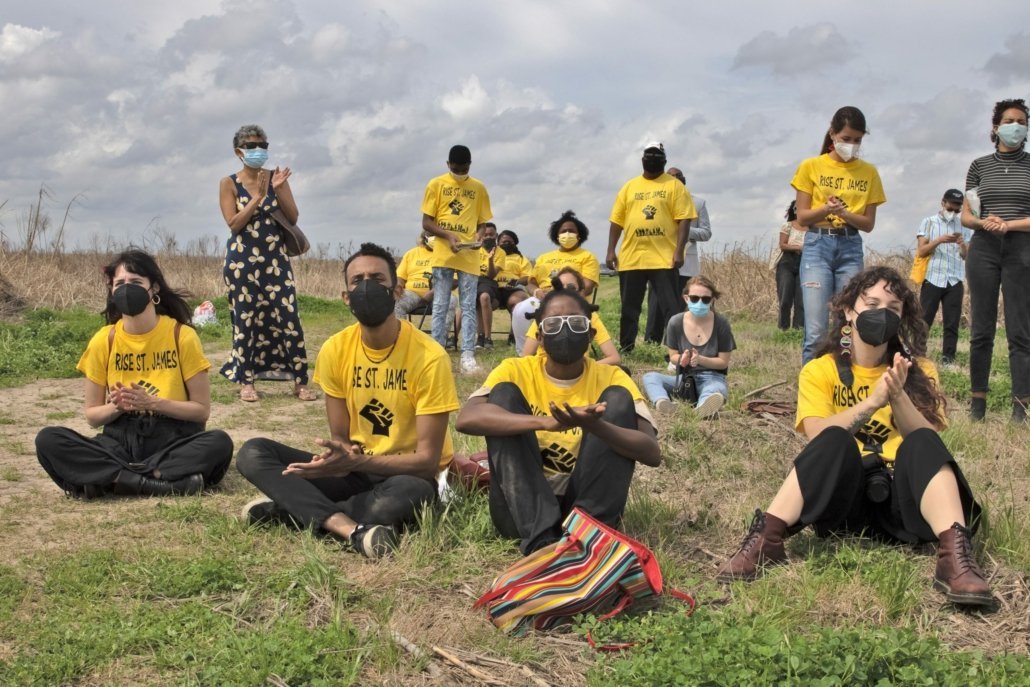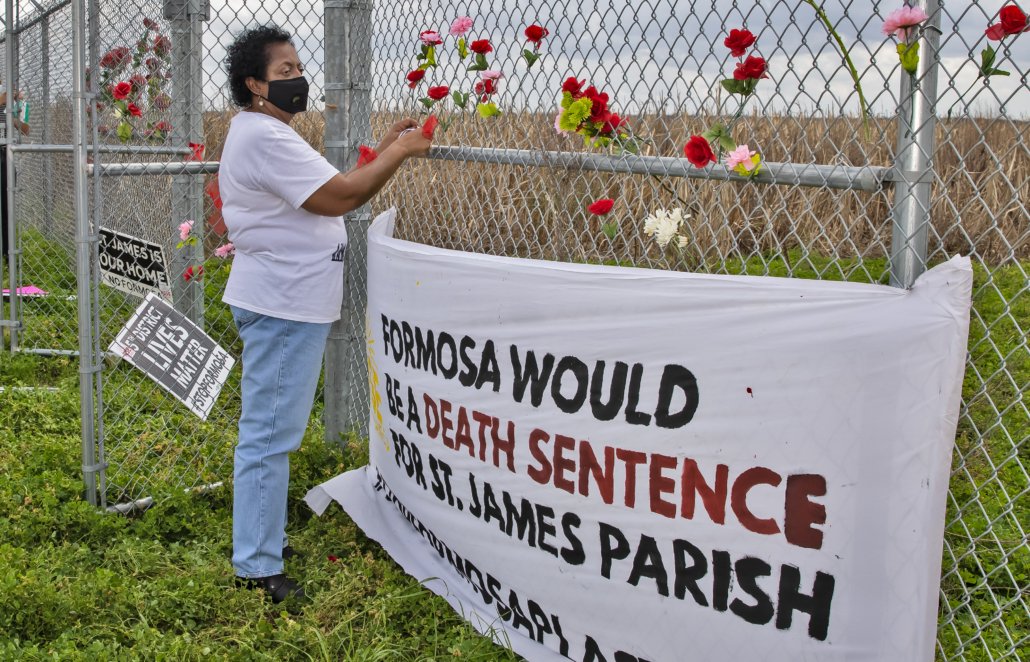 602
602  5 mins
5 mins Sharon Lavigne has lived in St. James Parish her whole life.
Her hometown is on the banks of the Mississippi River in Louisiana. She says that her childhood was like “living the American Dream.”
The Parish was a thriving place “with air, clean water,” recalls Sharon.
Her family lived off the land, growing gardens, fishing, and raising farm animals.
Yet looking back over the past 69 years, she sees a community forced to struggle with unimaginable changes.
The lush and fertile area by the river where Sharon once played is now a “fenceline community” in the 80-mile stretch of land between Baton Rouge and New Orleans, recently described by President Biden as “Cancer Alley.”
This is the story of how Sharon Lavigne, “grandmother-turned-accidental-activist,” began leading a grassroots fight against companies with plans to pollute the air and water of St. James Parish.
What happened?
1968 saw the establishment of the first chemical plant in the area.
New industry came with a promise – employment and prosperity for these low-income, minority communities.
Yet, although more plants followed, the promise of a better future somehow never materialized.
Quite the contrary.
For example, while St. James’ Parish is 50% BIPOC, studies have shown that the plants “only employed between 4.9% and 19.4% African Americans.“
And the relentless development of more than 150 petrochemical industrial facilities in Cancer Alley caused terrifying pollution.
“This industry is poisoning our air, poisoning our water,” says Sharon. It is responsible for uncounted pollution-related health problems – respiratory problems, asthma, cancer.
According to the EPA, her Parish has one of the highest concentrations of toxic chemicals in the U.S.
Cancer rates of the predominantly Black community are up to 50 times higher than the national average.
And nighttime chemical releases causing toxic “yellow rain” are regular occurrences.
Then, in 2014, the Parish Council secretly made a quiet change concerning “land use.”
The change had unintended consequences.

Industrial plants seen from the site where Formosa plans to build its petrochemical complex less than two miles from Sharon Lavigne’s home in St. James, Louisiana. Photo credit: Goldman Prize
The last straw
The Council made the 2014 zoning change without the consent or knowledge of the community.
It became possible to build and operate industrial sites within a mile of the homes of the people who lived there.
In November 2018, a foreign chemical company decided to take advantage of the new zoning.
The Wanhua Chemical Group announced negotiations to build a plastic manufacturing plant worth $1.25 billion in Convent, Louisiana.
The plant would produce hundreds of tons of methylene diphenyl diisocyanate and release carbon monoxide, formaldehyde, benzene, and other toxic pollutants into the environment.
The choice of the site was widely seen as an example of environmental racism.
Nonetheless, the Parish Council quickly accepted the project and granted the permits.
Furthermore, they decided to exempt Wanhua from paying any property taxes for ten years.
The exemption effectively freed Wanhua from contributing to vital community services like funding schools, roads, transportation, emergency services, parks, libraries, or sanitation.
The Wanhua project was the last straw for Sharon Lavigne.

Community members at RISE St James’ first annual African American Celebration. RISE celebrated the winners of its Black Historian Essay Contest.
Photo Credit: Goldman Prize
RISE St. James
When Wanhua announced their decision, Sharon was working as a special education teacher.
The project was presented as “a done deal.”
She recalls, “we’d leave in anger and despair and helplessness. We were angry inside, just roaring with anger.”
The daughter of civil rights activists, Sharon herself did not have experience as an activist.
But that didn’t stop her from trying to mobilize her neighbors.
She decided to take early retirement and dedicate herself to working full-time for environmental justice.
Sharon began by holding a meeting in her house with ten people from the St. James community.
The next meeting was in her garage, with almost twenty people. Her daughter took notes.
“I was sitting up there, directing the meeting. I didn’t know what in the world I was doing. The more they said to me, `There’s no hope,’ the more something inside of me riled up.”
They decided to call their faith-based, grassroots movement “RISE St. James.”
The movement gained momentum.
RISE St. James members attended council meetings. They marched and protested, wrote letters, and advertised in local newspapers and radio stations.
People went door-to-door, raising awareness and creating visibility for their cause.
And Sharon Lavigne met one-on-one with council members, asking them to rescind the permits they had given to Wanhua.
Actively engaging other citizens and with the support of experts and community leaders, the movement became a strong voice of opposition to the Wanhua plant.
And in September 2019, against all odds, RISE St. James undid the “done deal.”
Wanhua capitulated, withdrawing from the project.
“This is a victory for all of us,” said Sharon Lavigne.
But the fight doesn’t end here.

Sharon Lavigne at the burial site on the property that Formosa bought to build its petrochemical complex where members of RISE St. James held an event for Black History Month.
Photo credit: Goldman Prize
Formosa Plastics
The story of Sharon’s fight against the petrochemical industry does not end there.
As Wanhua was abandoning its project, Formosa Plastics, another foreign investor joined Louisiana’s Governor John Bel Edwards in announcing plans to build a $9.4 billion industrial complex in St. James Parish.
The Press Release from the Office of the Governor explained that the project was being branded as “The Sunshine Project”.
The factory would produce ethylene glycol, polyethylene, and polypropylene. It would also produce frightful pollutions including an estimated 14 million tons of CO2 per year.
Critically, the plant would be located just one mile from St. James’ elementary school and two miles from Sharon’s home.
As a result, RISE St. James immediately began working with other local activists and lawyers from around the country to halt this new project.
Following Sharon Lavigne’s address to the Working Group on Peoples of African Descent at the United Nations, the United Nations High Commissioner of Human Rights called the Formosa project “environmental racism” and urged U.S. officials to reject it.
This call to revoke the federal permits was echoed by the Attorneys General of New York, Connecticut, the District of Columbia, Massachusetts, and New Jersey in a 17 page letter to the U.S. Army Corps of Engineers.
The Attorneys General asked that the “environmental justice implications of issuing the permit” be reevaluated.
The fight is ongoing.
Construction activities at the site have begun.
RISE St. James and affiliated NGO’s are currently collecting signatures for a petition for President Biden.
Sharon Lavigne wins the Goldman Environmental Prize
For her remarkable work in protecting the residents of St. James Parish from additional air and water pollution and preventing the generation of a million pounds of liquid hazardous waste each year, Sharon Lavigne was awarded the 2021 Goldman Environmental Prize for outstanding achievement in North America.
Her fight against environmental racism provides a roadmap and brings hope to people in and beyond St. James Parish.
Sharon Lavigne and her community are currently fighting a battle that is a matter of life and death.
And in having defeated Wanhua project which was supposedly “signed and sealed”, she has already demonstrated that it is never too late to rise and fight against environmental and social injustice.
Want to help Sharon Lavigne stop the construction of Formosa Plastics? Sign Rise St. James’ petition and help them get 100,000 signatures. You can also other ways to take action on their website.
Feature image: Sharon Lavigne, photo credit: Goldman Prize


 Shutterstock / Rawpixel.com
Shutterstock / Rawpixel.com KieferPix / Shutterstock
KieferPix / Shutterstock